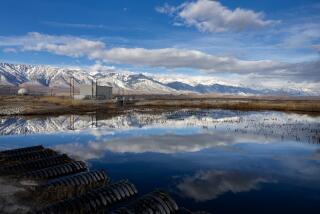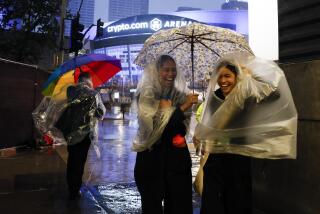Turn off the sprinklers
LOS ANGELES IS facing a “perfect storm” of drought, as Mayor Antonio Villaraigosa has put it. All of the city’s major water sources are running dry. Rainfall is the lowest it has ever been: just over three inches downtown this rainy season. The snowpack in the eastern Sierra Nevada, which usually supplies about half of L.A.’s water, is at its second-lowest level ever. The Colorado River also is in the midst of a severe drought and unlikely to rebound for several years.
Villaraigosa has called on Angelenos to voluntarily cut water use by 10%, recommending 10 common-sense household strategies -- taking shorter showers, sweeping sidewalks instead of hosing them down -- and touting three new technology initiatives: a “smart sprinkler” program, improved rebates for water-conserving appliances such as efficient washing machines and water recycling for irrigation and industry.
It’s a good start, but it might not be enough.
We’re not yet in the midst of the kind of multiyear drought that led Los Angeles to ban serving water unless requested in restaurants in the 1970s. But even if precipitation conditions improve, the water supply will remain endangered. The regulatory tangles that recently shut down the pumps in the Sacramento-San Joaquin Delta (through which two-thirds of the state’s water supply flows) won’t go away until the State Water Project is re-engineered, a task that has proved a challenge for decades. The Metropolitan Water District may need to draw as much as 600,000 acre-feet (about 23%) from its reserves to meet demand this year. That won’t be so easy in 2008 if we have another bone-dry winter.
Villaraigosa is a master of promising much and asking little. This time, city officials should be prepared to expand the call for conservation. Past efforts, such as adopting low-flow toilets and showerheads, have let Los Angeles blithely evade mandatory water restrictions. But such restrictions are historically commonplace in Northern California and should be on the table here too. In a city built on arid land, we must regard water with mindful respect and prepare for sacrifice if needed.
More to Read
Sign up for Essential California
The most important California stories and recommendations in your inbox every morning.
You may occasionally receive promotional content from the Los Angeles Times.










